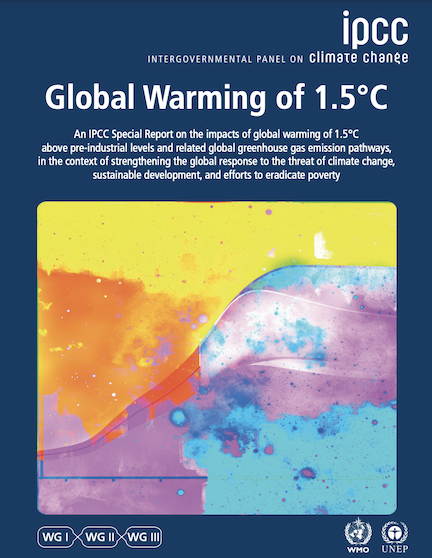Front cover image, 2018 IPCC (Intergovernmental Panel on Climate Change) Special Report
What is political science? What do political scientists study? And why does political science matter for solving climate change? This blog is for everyone who may have shrugged and said, “Ugh, I don’t understand / don’t like / don’t want to be involved in politics.” Politics matters for everything we as human beings do in this world, and politics especially matters when it comes to everything we do collectively—as a human society—including acting together to solve climate change. Let me explain!
Quick quiz: What is the goal of a political scientist?
- To RULE the WORLD
- To look better in bow ties than historians
- To answer Big Questions about political events and outcomes
- To misuse Capitalization to Make political science Great Again
Answer: The goal of a political scientist is to… C: answer Big Questions about political events and outcomes, like democracy, authoritarianism, the environment, war, poverty and inequality, and so on. Political scientists tackle these Big Questions in all sorts of ways—some use deduction to apply general theories to specific cases, others study specific cases and create / critique theory from these cases, and some combine these frameworks. Political scientists also gather their evidence in different ways, using qualitative methods (like interviews, observations, and historical and media sources) and quantitative methods (like surveys and big data analysis). Political scientists marshal all of this theory and evidence to create answers to these Big Questions that can provide insight into the past, the present, and even (sometimes!) the future.
What are the Big Questions of climate change? Of course, there are many, but one extremely important question is: Why haven’t we (as a global community) been able to solve the problem of climate change? (This question is an example of using theory and evidence to understand the past.) And this question leads to another important question: What are some ways that we (as a global community) can solve climate change in the future, before it’s too late? (This question is an example of using theory and evidence to drive policy and action plans for the future.)
Climate change is an existential problem that demands interdisciplinary solutions. I’ve written elsewhere about how political science offers three big ideas for how to motivate people to work together to solve climate change. But the urgency surrounding climate change cannot be overstated. The latest IPCC (the UN’s scientific panel on climate change) report, released in April 2022, stated, “The time for action is now.”
Joseph Romm, in his 2018 second edition of Climate Change: What Everyone Needs to Know, writes, “At the dawn of the Industrial Revolution 250 years ago, CO2 levels in the atmosphere were approximately 280 parts per million (ppm). . . . Emissions today are six times higher than they were in 1950. Moreover, CO2 levels now exceed 400 parts per million. As a result, the Earth has warmed 1.5 degrees Fahrenheit (0.85 degrees Celsius) since 1900. Most of this warming, approximately 1 degree Fahrenheit, has occurred only since 1970” (p. 2). At this rate, Romm writes, “We are headed to CO2 levels far above 600 ppm this century on our current emissions trajectory” (p. 30) (Note: An updated third edition of this must-read book is coming out in September 2022!)
These skyrocketing carbon dioxide levels mean that we are rapidly warming our planet. The UN IPCC expects us to reach 1.5 degrees Celsius of warming by 2040. As these interactive New York Times graphs show, even if we keep our warming to 1.5 degrees—as opposed to the 2 degrees we’ve been trying to avoid—we’ll still experience extreme heat, water scarcity, and drought, and we will lose most of our coral reefs and Arctic ice. And of course reaching 2-degree warming makes all of these consequences much, much worse. (The IPCC’s recent report in February 2022 casts doubt on our ability as a human race to even adapt to temperatures more than 1.5 degrees higher.)
What does all this mean? We have to act quickly, as a global community, to reduce our greenhouse gas emissions. But unfortunately, the New York Times notes that while it is technically possible to transform the world economy within just a few years to avoid this level of global warming, it is, quote, “politically unlikely.”
And this background information returns us to our two Big Questions:
- Why haven’t we (as a global community) been able to solve the problem of climate change? In other words: How did we GET ourselves into this kind of situation?
- What are some ways we (as a global community) can solve climate change in the future, before it’s too late? In other words: Why is it “politically unlikely” that we would be able to solve it? Can we figure out how to make a solution more politically likely?
Political science is uniquely poised to tackle these questions, through the politics of collective action. In my next blog, I’ll explain more about how political science studies how and why human communities make collective decisions—and why these insights hold the key to understanding and solving climate change.
Note: Much of this material is originally from my political science lectures from our interdisciplinary “Ways of Knowing: Climate Change” course. I am available (and willing!) to present this material to a public audience!
